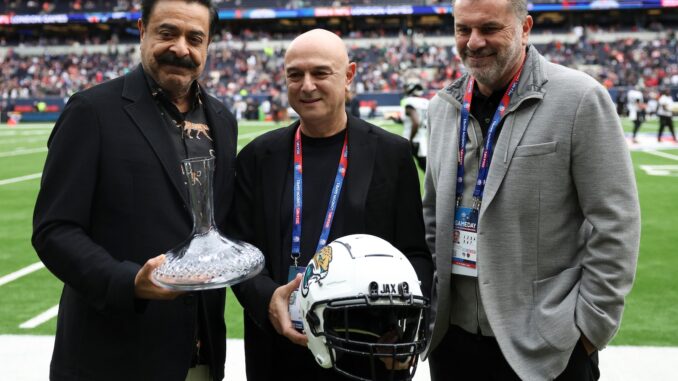
NFL owners unanimously approved Jacksonville’s $1.4 billion “stadium of the future” Tuesday, a decision that should keep the Jaguars in one of the league’s smallest markets for at least another 30 years.
With the Jags (1-5) getting ready to play the second of back-to-back games in London, NFL owners essentially ended decades of speculation about the franchise being a potential relocation candidate.
“Actions speak louder than words,” owner Shad Khan said. “And I think we’re going to have some real action.”
Twenty-four of 32 owners were needed to approve the project at the league’s fall meetings in Atlanta. It was considered such a rubber-stamp situation that Khan and team president Mark Lamping were allowed to skip the meetings and avoid 12 hours of travel from London to Atlanta and back.
The Jaguars didn’t anticipate much pushback even though the 55-45% financial split — with the city on the hook for the majority of the deal — is higher than most NFL owners contribute to new or renovated stadiums.
“I’m gratified but not surprised,” Khan said. “We’ve been working on it for a long time. We’ve talked to all the owners one-on-one. Obviously, (commissioner) Roger (Goodell) has been highly supportive, a big part of it. I think it’s great to get to this point.”
Each side will pay $625 million toward the $1.25 billion project. Jacksonville, which won’t levy any new taxes to fund its part, will chip in another $150 million in deferred maintenance to get EverBank Stadium ready for construction.
Pre-construction work is scheduled to start in February. The Jaguars expect to play in front of a slightly reduced capacity in 2025, a significantly reduced capacity (no upper deck) in 2026 and then host home games in Gainesville or Orlando the following year. They also could play multiple home games overseas, in London and possibly Ireland.
The renovation agreement with the city allows the Jaguars to play up to six home games internationally between 2025 and 2027, with a maximum of three during the first two years and up to three more in 2027.
The project also will affect the annual Florida-Georgia game and the Gator Bowl; Florida and Georgia have bid their rivalry out for consecutive years, with expected destinations being Atlanta in 2026 and Miami, Orlando or Tampa in 2027. The Gator Bowl is planning to play in Jacksonville in 2026 and potentially Gainesville in 2027.
The stadium plan includes a 30-year lease, a non-relocation agreement and a provision that limits the number of games the Jaguars can play outside Jacksonville. Under the new lease, the Jaguars would play all preseason and postseason home games in Jacksonville and would continue to play one home game a year in London, likely at Wembley Stadium.
The Jaguars agreed to take on all construction cost overruns, assume day-to-day operations of the stadium and bear 80.4% of game day expenses moving forward.
The proposed 63,000-seat, open-air stadium includes a translucent covering that’s the equivalent of “wearing shades in the sun,” Lamping has said. It’s expected to lower outside temperatures by 15 degrees.
Capacity could expand to 71,500 to accommodate Florida-Georgia, a College Football Playoff game or the Final Four. Pools and a party deck will remain in the north end zone.
The stadium will be the centerpiece of a downtown entertainment district in Jacksonville. A Four Seasons hotel and residences project is currently under construction as well as a new office building for the Jaguars, a shipyards project that will include a modern marina and eventually a University of Florida satellite campus that would bring in 10,000 graduate students to the area.
___
AP NFL: https://apnews.com/hub/nfl


Be the first to comment